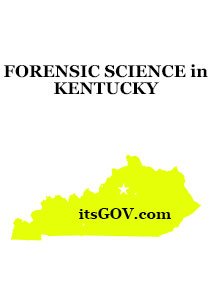Forensic Science
Forensic science combines science and investigation in order to aid and support the prosecution or defense in criminal and civil investigations. While the profession has been widely romanticized by various TV shows, make no mistake – this job is most likely different that you expect. In contrast with popular perception, this is a highly scientific role, which often involves detailed, painstaking work. Field duties are limited to a few areas of expertise, and most often than not a forensic scientist will spend his time in the lab.
If you made it this far, though, congratulations! You’re taking the first steps in joining a very rewarding profession and itsGOV is here to guide you through what you need to know and what you need to do to join a forensic science program in Kentucky.
Depending on the type of forensic science practiced, different degrees and educational backgrounds may help a candidate get a job and excel in this field. Regarding formal education, requirements vary across jobs, but you should definitely have a solid background in mathematics, biology and chemistry.
The National Institute of Justice, a division of the U.S. Department of Justice, offers guidelines for model undergraduate and graduate forensic science degree programs. According to the American Academy of Forensic Science, strong programs should offer a curriculum that concentrates on scientific writing, laboratory skills, public speaking, and computer software application training.
The State of Kentucky, which is home to one of the oldest forensic science programs in the nation, has a number of undergraduate and graduate forensic science colleges and degree-granting schools, including a Bachelor of Science in Forensic Science, with a Forensic Biology or Forensic Chemistry concentration.
Forensic Science Requirements in Kentucky
The Forensic Chemistry option is often chosen by students seeking careers in crime labs in such specialties as toxicology, trace evidence, and firearms, while the Forensic Biology option is often chosen by students seeking forensic science careers that are focused on DNA and biology work.
Core requirements in a Bachelor of Science in Forensic Science programs typically include:
- General Chemistry
- Analytical Chemistry
- Organic Chemistry
- Biophysical Chemistry
- Instrumental Analysis
- Forensic Instrumental Lab
- Forensic DNA Analysis
If a Forensic Chemistry option is chosen, students are required to complete a number of other courses, such as:
- Forensic Trace Evidence
- Forensic Analytical Toxicology
- Drug Chemistry
- Drugs and Toxicology Lab
- Forensic Microscopic Analysis
- Mass Spectrometry
Candidates for forensic science jobs in Kentucky must possess a bachelor’s degree in one of the following programs (or a closely related field):
- Chemistry
- Forensic science
- Biology
- Microbiology
- Biochemistry
- Medical technology
- Engineering
- Mathematics
- Criminal justice
For advanced forensic scientist jobs in Kentucky, candidates must have professional laboratory experience working in a specialty area of forensic science. A master’s degree in one of the natural sciences, however, may be substituted for a portion of the experience requirement.
Achieving a forensic scientist job may also include undergoing a background investigation, drug screen, and fingerprinting, among others. Depending on the forensic science specialty, candidates may also be required to possess specific college coursework or professional certification.
Forensic Science Training in Kentucky
Students wanting to enter the field of forensic science will find a variety of degree options through forensic science colleges in Kentucky and through online schools. Nationwide, opportunities are growing for forensic science technicians, and graduates of forensic science programs could look for jobs in crime labs and with police departments, and perhaps in larger cities, such as Lexington and Louisville. The American Academy of Forensic Science (AAFS) also provides additional resources to students, with these ranging from information about upcoming events to fellowship and employment opportunities. Students of forensics colleges in Kentucky should likely be eligible for student affiliate status.
Forensic Science Salary in Kentucky
Fifty forensic science technicians were employed in Kentucky in 2012 according to the Bureau of Labor Statistics (BLS). They earned an annual median wage of $39,930. Experienced professionals made substantially higher wages. The average salary of forensic scientists in the top tenth of their profession was $50,420 in 2012.
The Kentucky Education and Workforce Development Cabinet estimates employment in this field will increase 14.29% in the period from 2010 to 2020. Jobs for forensic scientists in Kentucky are located all around the state, since the Kentucky State Police has six different forensic labs. They are located in the following cities:
- Ashland
- Cold Springs
- Frankfort
- London
- Louisville
- Madisonville
In addition to those forensic scientists who work for the state of Kentucky, others are employed by municipal and county law enforcement organizations.
While many forensic scientists work as technicians in the lab, others work in the field. The latter group is comprised of crime scene investigators (CSIs). Some CSIs are police officers with special training in forensics, while other positions go to civilians.
The wages of CSIs can vary dramatically, depending on how specialized the technician is and their years of experience. One typical crime scene investigator job is an evidence technician. Such a position in Paducah paid from $29,700 to $43,100 in 2013.
Forensic Science Schools and Colleges in Kentucky
Bachelor’s Degree Programs in Kentucky
| University | Murray State University, Chemistry Major with Forensic Track B.S. |
| Duration | 24 months |
| Type | Full time, Part time |
| Tuition and fees | $17,580 per year |
| Program link |
| University | Thomas More College, Forensic Chemistry B.S. |
| Duration | 24 months |
| Type | Full time, Part time |
| Tuition and fees | $26,500 per year |
| Program link |
| University | Eastern Kentucky University, Forensic Science B.S. |
| Duration | 24 months |
| Type | Full time, Part time |
| Tuition and fees | $25,968 per year |
| Program link |
[tab title=”Eastern Kentucky University Program Information”]
The Forensic Chemistry Option provides a strong foundation in chemistry and laboratory techniques if you wish to pursue a career in crime labs in both the public and private sector. It is also possible to double major in this option and the B.S. Chemistry, Chemistry option which will provide increased opportunities in the job market.Career opportunities may include positions in drug, toxicology, trace evidence, arson and firearms sections of state, federal and private crime laboratories. Due to the strong chemistry background, you are also well suited for positions in related fields such as chemical technicians in environmental, pharmaceutical and biotechnology laboratories. The Forensic Biology Option offers a strong core academic curriculum in Chemistry, but also offers a sound background in the biological sciences, making it the perfect option if you are interested in DNA and biology work. Career opportunities may include positions in DNA and biology sections of state, federal and private crime laboratories or as technicians in environmental, pharmaceutical and biotechnology laboratories. The core modules are:
- Introduction to Forensic Science
- Forensic Professional Practice
- Instrumental Analysis
- Forensic Instrumental Lab
- Forensic Trace Evidence
- Forensic Trace Evidence Lab
- Forensic DNA Analysis
- Forensic Analytical Toxicology
- Drug Chemistry
- Drugs and Toxicology Lab
- Forensic Microscopic Analysis
- Selected Topics in Forensic Science
[/tab] [tab title=”Other useful information”]
The mission of the Forensic Science program at Eastern Kentucky University is to provide a rigorous science-based undergraduate education that will prepare students for careers in forensic science or other careers requiring scientific backgrounds.
In order to fulfill the mission and maintain the high standard of professional excellence, the student will be able to: obtain a knowledge base sufficient to explain the fundamental science of work typically performed in forensic science, chemical or other science laboratories; demonstrate the critical thinking skills necessary to work successfully as a forensic scientist, chemist, or other related science professional; model appropriate attitudes, values and ethics for a forensic scientist, chemist or other related science professional.
Master’s Degree Programs in Kentucky
There are currently no master’s programs offered in Kentucky.









